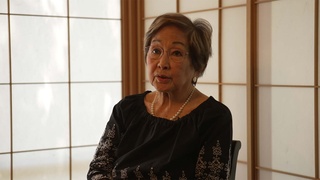Interviews
His parents' experience with Japanese resistance toward intermarriage with Okinawans
My father was Okinawan and my mother Japanese, what they call Naichi. And those days, the Okinawans and the Japanese, they're not too keen about marrying like that. It's just like me, now, when I met my wife. My name is Yonamine, that's an Okinawan name, and my wife's name was Iwashita. And lot of times, my wife's parents wasn't too keen about me going with their daughter. My wife's parents used to get calls from the Okinawans says that Leave the Okinawan boy alone. Let your daughter marry the Japanese, the Okinawans marry the Okinawans.
Date: December 16, 2003
Location: Hawai'i, US
Interviewer: Art Hansen, John Esaki
Contributed by: Watase Media Arts Center, Japanese American National Museum.










